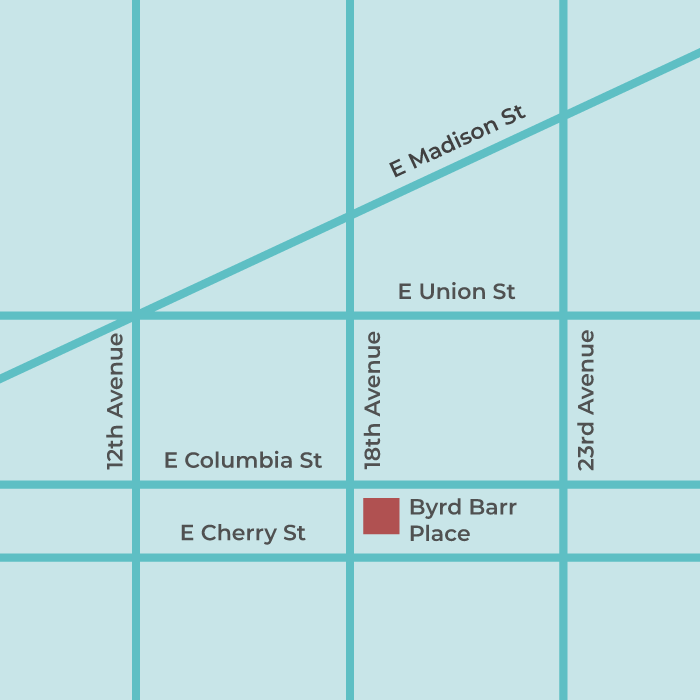
Rooted Communities: Placemaking, Placekeeping
In Seattle’s Central District, development is driving out Washington’s largest African American Community and reducing opportunities for wealth accumulation and creation among lower and middle classes. Recent development patterns are creating displacement of both land owners and existing tenant residents and businesses, alike. This dispersal impacts the Black community’s political representation, as well as its social, cultural and economic capital.
In a single generation, the African American population in this neighborhood has decreased from 70% to less than 20%, driving a cultural “diaspora” from Seattle’s historically Black area for over 130 years. Shaped by racist housing policies that pushed families of color into the neighborhood and limited access to economic mobility, the community built up powerful neighborhood businesses and institutions in the 1970s. Now, families, businesses, and institutions that have lived and operated in the Central District, or “CD”, are being forced out by surging rents and taxes, and a loss of community.
African Americans in Seattle have a homeownership rate of 24%, precipitously lower than the roughly 40% experienced by African American’s nationally, the latter rate virtually unchanged since 1968 and a third less than the 70% enjoyed by Whites today.[i] Lack of African American home ownership increases vulnerability and susceptibility to gentrification-induced displacement, which drives rent increases, reduces affordable housing inventory, and rolls back economic opportunity for established community members.
Housing un-affordability coupled with historically low incomes for Seattle’s Black communities continues to drive displacement, signaling to Seattle’s African American Financial Capability Initiative (AAFCI) Community of Practice (CoP) that a more synergistic approach is necessary to combat the impacts of gentrification. To this end, Seattle’s own aspiring Africatown Community Land Trust (CLT) provides a promising model for how to negotiate partial ownership in proposed private sector developments within historically Black communities. The CLT is actively involved in two commercial development projects for the Liberty Bank Building and Midtown Plaza which will provide over 250 affordable housing units in the heart of Seattle. Three additional projects are on the horizon, with the goal to ensure African American families most threatened by displacement can live and thrive in the city.
Africatown is part of the Seattle AAFCI, a transformative coalition of African American organizations motivated to find long-term community-based solutions. Africatown seeks to preserve and develop the African American and African diaspora presence in the Central District of Seattle and surrounding areas through community economic development and development of low income housing. Seattle’s Community of Practice model, part of a 6 city Initiative funded by the Northwest Area Foundation and supported by the Racial Wealth Divide Initiative at Prosperity Now, has 3 years serving the community, and is comprised of Africatown Community Landtrust, Byrd Barr Place, Urban League of Metropolitan Seattle and Washington State Commission on African American Affairs.
The collective work is driven by findings from the report, “Creating an Equitable Future in Washington State: Black Well-Being & Beyond,” which assessed barriers to economic success and encourages diverse groups to work together to develop innovative solutions.
Community Land Trusts (CLTs), traditional African American collaborative ownership models, have proven to slow the negative impacts of gentrification and work as a mechanism for land development and ownership. CLTs are legal structures of communally-owned property that are formed with the intent to uphold long-term control of land – often for the purposes of preserving a cultural and/or economic mission such as affordability of businesses and housing. There are hundreds of CLTs in the United States, but relatively few exist in urban areas. Even fewer address the racial disparity of gentrifying cities. However, those that do address issues of equity – such as Dudley Street in Massachusetts – are proving successful.
Drawing upon the strength of this historic culturally-anchored model, Seattle’s CoP is developing a 21st century African American Community Land Trust blueprint.
Building on the recent success of the Africatown CLT, the CoP is finalizing a replication model to help national communities of color grappling with the impacts of gentrification in mid-tier metropolitan areas where land is still readily available. The goal is to enable local communities to easily understand, form, and run CLTs. Next steps for this pilot phase include working with other similarly situated communities across the state and nationally to implement a similar mission and model. The AAFCI project will launch this innovative solution in the autumn of 2018.
As a means to engage displaced and dispersed community members at the individual and family level, Seattle CoP also plans to include a culturally-responsive financial education program that focuses on both maintaining short-term personal finances, as well as long-term wealth-building. Current programs serve over 456 individuals in the community, with 245 achieving some or all their stated financial goals. The Seattle CoP is exploring how to augment existing programs and community development networks to more consistently deliver content and technical assistance in formats that are motivating and actionable.
As Seattle moves to identify and build upon what works for African American communities, we are hopeful that the community engagement and CLT models we develop here can serve as an example for communities of color nationally who are dealing with multi-systemic issues of gentrification and displacement. We are truly stronger together, particularly when our work builds upon rich traditions and models.
[i] https://www.epi.org/publication/50-years-after-the-kerner-commission/

